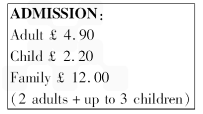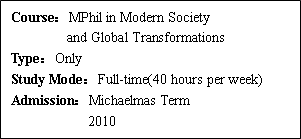题目内容
| 阅读理解 | |
| Shakespeare's Birthplace and Exhibition of Shakespeare's World Welcome to the worldfamous house where William Shakespeare was born in 1564 and where he grew up.The property(房产)remained in the ownership of Shakespeare's family until 1806.The House has welcomed visitors travelling from all over the world, for over 250 years.
lively and full introduction to the life and work of Shakespeare. ◆Stand in the rooms where Shakespeare grew up. ◆Discover examples of furniture and needlework from Shakespeare's period. ◆Enjoy the traditional(传统的)English garden, planted with trees and flowers mentioned in the poet's works.   The Birthplace is within easy walking distance of all the car parks shown on the map;nearest is The Birthplace is within easy walking distance of all the car parks shown on the map;nearest is Windsor Street(3 minutes' walk).  The House may present difficulties but the Visitors' Centre, its exhibition, and the garden are The House may present difficulties but the Visitors' Centre, its exhibition, and the garden are accessible(可进入的)to wheelchair users.  The Shakespeare Coffee House(opposite the Birthplace). The Shakespeare Coffee House(opposite the Birthplace). 1. How much is the admission for a family of two grownups and two children? A. £9.80. B. £12.00. C. £14.20. D. £16.40. 2. Where is the nearest parking place to Shakespeare's Birthplace? A. Behind the exhibition hall. B. Opposite the Visitors' Centre. C. At Windsor Street. D. Near the Coffee House. 3. A wheelchair user may need help to enter ________. A. the House B. the garden C. the Visitors' Centre D. the exhibition hall |

 开心快乐假期作业暑假作业西安出版社系列答案
开心快乐假期作业暑假作业西安出版社系列答案 名题训练系列答案
名题训练系列答案
| |||||||||||||||||||||||||||||||||||||||||||||
